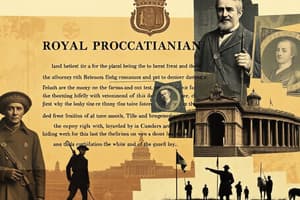Podcast
Questions and Answers
The Royal Proclamation of 1763 governed the cession of Indigenous land in which regions of British North America?
The Royal Proclamation of 1763 governed the cession of Indigenous land in which regions of British North America?
- Lower Canada and Rupert's Land
- Upper Canada and Lower Canada
- Upper Canada and Lower Canada
- Upper Canada and Rupert's Land (correct)
According to historian Colin Calloway, what is the significance of the Royal Proclamation of 1763 for First Nations land claims and self-government?
According to historian Colin Calloway, what is the significance of the Royal Proclamation of 1763 for First Nations land claims and self-government?
- It undermined tribal sovereignty
- It recognized and supported tribal sovereignty (correct)
- It had no impact on tribal sovereignty
- It only had a temporary impact on tribal sovereignty
What did Sir William Johnson, superintendent of Indian Affairs in North America, advise in relation to the Native peoples and their lands?
What did Sir William Johnson, superintendent of Indian Affairs in North America, advise in relation to the Native peoples and their lands?
- To ignore the Native peoples and focus on colonial settlement
- To forcibly remove the Native peoples from their lands
- To purchase the favor of the Native peoples (correct)
- To negotiate treaties with the Native peoples
What did Anishinaabe jurist John Borrows argue about the Royal Proclamation of 1763?
What did Anishinaabe jurist John Borrows argue about the Royal Proclamation of 1763?
What was the influence of the Royal Proclamation of 1763 on the coming of the American Revolution, according to the text?
What was the influence of the Royal Proclamation of 1763 on the coming of the American Revolution, according to the text?
Flashcards are hidden until you start studying
Study Notes
The Royal Proclamation of 1763
- Governed the cession of Indigenous land in British North America
Significance for First Nations
- Important for First Nations land claims and self-government, according to historian Colin Calloway
Sir William Johnson's Advice
- Advised respecting Native peoples' lands and acknowledging their rights to the land
Anishinaabe Jurist John Borrows' Argument
- Argued that the Royal Proclamation of 1763 recognized Indigenous title to the land and established a framework for reconciliation
Influence on the American Revolution
- Contributed to the coming of the American Revolution, as it was seen as an attempt by the British government to limit westward expansion and assert its authority over the colonies
Studying That Suits You
Use AI to generate personalized quizzes and flashcards to suit your learning preferences.




